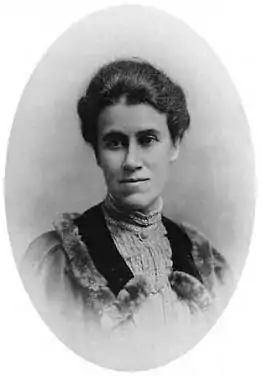Helen Bosanquet
Helen Bosanquet (née Dendy; 10 February 1860 – 7 April 1925)[1] was an English social theorist and social reformer. Helen was the wife of English philosopher Bernard Bosanquet.
Helen Bosanquet | |
|---|---|
 Helen Bosanquet, c. 1900 | |
| Born | Helen Dendy 10 February 1860 Manchester, England |
| Died | 7 April 1925 (aged 65) |
| Alma mater | Newnham College, Cambridge (1889) |
| Occupation | Social theorist and reformer |
| Spouse(s) | |
| Parent(s) | Revd. John Dendy Sarah Beard |
| Relatives | Mary Dendy (sister) Arthur Dendy (brother) |
Biography
Early life
Helen Dendy was born in Manchester in 1860 to the Reverend John Dendy and his wife, Sarah Beard (1831–1922), eldest daughter of John Relly Beard. She was one of nine children. Mary Dendy was an elder sister and her brother was biologist Arthur Dendy (1865–1925).
Education
Helen and her sisters were educated at home by a governess. In 1886, at the age of twenty-six, she went to Newnham College, Cambridge, to study moral sciences. She obtained a first-class degree in 1889 and appears to have had academic ambitions. However, she failed to get any academic position.[2]
Career
Having moved to London, she joined the Charity Organisation Society (COS), a body committed to rationalizing London's huge collection of private charities. She became organizer and district secretary of the society's Shoreditch branch. She was also active in the London Ethical Society, where she met the philosopher Bernard Bosanquet (1848–1923), whom she married on 13 December 1895.[3] In addition to an active public career as a theorist and publicist for the COS, she worked as a translator of German philosophy and sociology, and as a collaborator with her husband.
Works
In 1902 Bosanquet had a much publicised exchange of views with Seebohm Rowntree, in which she questioned his findings about the extent and the causes of poverty in York. One of these works included the article "A Study in Women’s Wages" which was published as part of "The Economic Journal". This article lobbied for an in increase in the training of women for skilled jobs which would thus result in better working conditions and wages for them.[4] In her article "The Lines of Industrial Profit", Bosanquet offers the idea that business-men of the same trade must agree on fixed prices to reap larger profits and provide their workers with better wages.[5] In her piece, "The Divorce Laws of England and Wales", she offers the idea that young people should not be forced to take a permanent vow as the longevity of a marriage depends on several conditions.[6] She was appointed a member of the Royal Commission on the Poor Laws in 1905, where she defended the role of private charities over public welfare programs. She was a major influence on the Majority report (Poor Law), which was published in 1909, which arose out of the Commission.[7] Another member of the Commission was social reformer, Beatrice Webb and the two were often in disagreement. Webb wanted to abolish the Poor Laws and have state-run social services, while Bosanquest wanted to keep some aspects of the Poor Laws.[8]
Legacy
Bosanquet also played a key role in the development of social work in Britain, through her suggestion that social workers needed formal education as well as professional skills. She influenced the syllabus of the COS School of Sociology (founded 1903), which in 1912 became the Social Science Department of the London School of Economics.
Her influential English translation of Christoph von Sigwart's Logic appeared in 1895.
Following the death of Bernard Bosanquet in 1923, Helen arranged for the manuscript of Three Chapters on the Nature of Mind to be published. Her biography of her husband was published in 1924. She died in Golders Green, London in 1925, having suffered from ill health for some years.
Quotes
“I have always held that poverty and pain, disease and health are evils of greatly less importance than they appear except in so far as they lead to weakness of life and character; and that true philanthropy aims at increasing strength more than at the correct and immediate relief of poverty…”[9]
"The working-women of England are indeed in a very sorry plight, and that if knights-errant were still to the fore they would find work enough for lance and sword in freeing their sisters from the tyranny by which they are oppressed"[10]
Works
- Helen Bosanquet, "The Name and the House,” The Family. London: MacMillan, 1906.
- Aspects of the Social Problem (1895)
- Rich and Poor (1896)
- The Standard of Life and Other Studies (1898)
- The Strength of the People (1902)
- The Poor Law Report of 1909 : A Summary Explaining the Defects of the Present System and the Principal Recommendations of the Commission, so far as Relates to England and Wales (1909)
- Bernard Bosanquet : A Short Account of His Life (1924)
References
- Women of History
- Harris, Jose. "Bosanquet , Helen (1860–1925)". Oxford Dictionary of National Biography. Retrieved 7 July 2017.
- Archives Hub: Bosanquet Papers Archived 22 July 2012 at Archive.today
- Bosanquet, Helen (1902). A Study in Women's Wages. The Economic Journal. pp. 42–49.
- Bosanquet, Helen (1897). The Lines of Industrial Profit. The Economic Journal. pp. 503–510.
- Bosanquet, Helen (1914). The Divorce Laws of England and Wales. The University of Chicago Press. p. 451.
- Scott, John, ed. (2007). Fifty Key Sociologists: The Formative Theorists. Routledge. p. 20. ISBN 9781134262199.
- Lewis, Jane (1991). Women and Social Action in Victorian and Edwardian England. Stanford University Press. pp. 146–192.
- Charity begins at home: Helen Bosanquet, the pioneer behind the Charity Organisation Society
- Charity begins at home: Helen Bosanquet, the pioneer behind the Charity Organisation Society